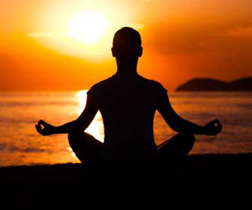Relaxation Techniques: Anxiety Relief Breathing Exercise
There are certain relaxation techniques I've found genuinely helpful - and have come to rely on - to deal with specific anxiety issues like:
- getting to sleep - ever;
- my phobia of flying, and;
- managing daily anxiety and depression.
Relaxation techniques relieve anxiety because they literally change your mind. They allow you to settle into the brain wave states that are normally only active during sleep. Basically you're alert and fully relaxed, getting a whole heap of the benefits of sleep, without the bother.
What to Expect When You Use Relaxation Techniques
 Relaxation techniques and meditation not only improve the quality of my sleep but help me get to sleep with less medication; a definite plus since the sleep medications can make my depression worse, if I'm not careful (Meditation for Treating Psychological Disorders).
Relaxation techniques and meditation not only improve the quality of my sleep but help me get to sleep with less medication; a definite plus since the sleep medications can make my depression worse, if I'm not careful (Meditation for Treating Psychological Disorders).
Meditation isn't usually some huge mystical experience. Most of the time it's just you sitting with yourself and feeling whatever you're feeling long enough for that feeling to change. Experiencing that process of change, whilst staying connected to a thought or to your breath, is what changes your mind. And it really does.
Relaxation Techniques Are Exercises for Your Brain
You need to let your brain form a habit of relaxing in a certain way. Takes most people around 6 weeks. So no, not as useful as a pill in a crisis, but over time, much more effective (and easier on the liver).
The other major benefit of these relaxation techniques is that they've helped me feel more in control. Fearing a lack of control is one issue most anxiety sufferers have in common. We like to feel in control of our lives. There's nothing wrong with that. In fact, I encourage it. Healing is about feeling in control in a balanced way - without feeling trapped or overwhelmed, or speeding off into a panic attack if you slip now and again.
Relaxation Technique in a Breathing Exercise
It's best if your first few tries of the following relaxation technique are when you're not too close to panic. That way, it'll feel more comfortable when you try to use it when you really need it. It took me ages to truly work any breathing exercise into my routine. And, of course, a breathing exercise won't work for every situation in which I might possibly be anxious.
Try this stress relief breathing exercise that works for me.
See Also
Relaxation Techniques for Relief of Anxiety and Stress
Meditation for Depression, Anxiety, Insomnia
APA Reference
White, K.
(2010, December 30). Relaxation Techniques: Anxiety Relief Breathing Exercise, HealthyPlace. Retrieved
on 2026, March 5 from https://www.healthyplace.com/blogs/treatinganxiety/2010/12/stress-relief-breathing-exercise
Author: Kate White
This might just be me, but when you were talking about my arms being heavy, I started picturing them very large and fat... this was an uncomfortable thought pattern, almost inducing panic. Is there an "your arm is very light" version that would work as well ?
Hi Max,
I do know versions that are more about lightness and release, versus this one which is obviously very much about feeling grounding in oneself - which can definitely be a trigger for some folks. So, if you'd like I could put that up as an audio? Let me know if that might be a useful thing. I'd be happy to.
It's pretty common to feel some level of self-consciousness or body anxiety come up in response to these types of exercises. At first. Part of meditation is working with those uncomfortable thought patterns - trying to see if you can bring your mind really gently back to just the breathing before focusing too much on the thoughts or sensations which are provoking uncomfortable feelings.
But if you're just starting out then it's definitely easier to make relaxation/breathing techniques a habit if the script suits you. That just varies pretty widely - and I'm a pretty firm believer that anxiety is as individual as the people who experience it!